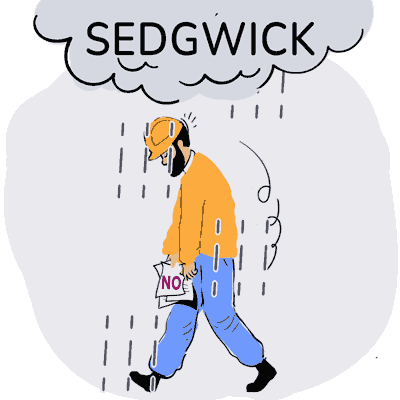RAND Gets $300K for UR Study—What's the ROI?
.gif)
The California Department of Industrial Relations (DIR) plans to address the state’s broken Utilization Review (UR) system—by paying frequent contract recipient RAND Corporation $300,000 to study UR data on injured workers’ access to care during the first 30 days of a claim.
However, as we reported previously, the DIR’s Division of Workers’ Compensation (CA DWC) never collected the UR data that RAND presumably needs to study.
Accordingly, why did the DIR award RAND a lucrative $300,000 contract for research that can’t occur without UR data? Without UR data, what can RAND possibly analyze? Tea leaves? The stars? Vibes?
The questions are even more critical given the Commission on Health and Safety and Workers’ Compensation (CHSWC)'s concerns about the quality of RAND’s work and the frequency with which the DIR grants RAND these contracts.
CA DWC Ignores Data Collection, DIR Hands Out Data Analysis Contracts
In 2016 and again in 2019, California legislators mandated UR data collection and transparency through Senate Bill 1160 and Senate Bill 537. The laws required the CA DWC to collect and publicly report data on how often claims administrators approve, deny, or modify treatment requests.
The CA legislature’s UR data demands were straightforward:
- Require the CA DWC to establish a way for claims administrators to submit all UR documents to the state electronically, and
- Contract with an independent research organization to evaluate the impact of the provision of medical treatment within the first 30 days after a claim is filed
SB 537 amended California Labor Code Section 138.8 to:
- Require the CA DWC to publish provider utilization data for physicians who treated 10 or more injured workers
Legislators intended to reveal UR denial patterns, identify bad actors, and lay the groundwork for reform. Fast-forward to 2025, and the CA DWC has implemented none of these legal mandates.
There is no UR database, published statistics, or known attempts to impose accountability. The CA DWC has opted to ignore California law.
Now, the DIR is offering more taxpayer money to RAND to study non-existent UR data.
RAND: First In Line for CA Research Contracts
Enter RAND Corporation, the California government’s go-to research contractor. Now, RAND is poised to make another $300,000 to analyze how UR impacts injured workers.
According to Commission on Health and Safety and Workers’ Compensation (CHSWC) members, RAND wins these contracts with little or no competition despite producing studies that Commissioners find lacking scope, methodology, and valuable insights.
As one CHSWC Commissioner put it in a meeting earlier this year:
“We're the fifth largest economy in the world. There have to be other folks who can qualify for [research contracts].”
The RFP instructs RAND to use data from the Workers’ Compensation Information System (WCIS) and Electronic Adjudication Management System (EAMS). However, neither WCIS nor EAMS includes UR approval, modification, or denial data.
In the same CHSWC meeting, regarding a RAND study concerning firefighters, a Commissioner noted (emphases ours):
“ …they only interviewed as you've heard before, 13 workers were interviewed with, you know, a statewide research that cost a quarter of a million dollars.
We were concerned after the fact that the narrowness of the interviewees that took place really didn't comport with what the impetus was for having the study…
…as a result of the way that the study was conducted, it really didn't capture what needed to be captured…what was the purpose of the study to begin with?”
The Consequences of UR Mismanagement
We’ve seen and reported on the consequences of UR without oversight:
- Sedgwick brags about derailing more than half of treatment requests.
- Insurers delay care for months (or more) on end.
- Doctors receive conflicting UR decisions—on the same medical request—weeks apart.
daisyBill data show that claims administrators fail to approve around 30% of doctors’ recommended treatments year after year. Yet the CA DWC has shown no interest in analyzing these UR denials despite being legally required to do so.
Instead, the DWC shields claims administrators, leaves injured workers in limbo, and signals that UR will remain a free-for-all (performative studies aside).
Follow the Money (and Read the Room)
California workers’ comp doesn’t need another “study.” It needs DIR and DWC compliance.
The laws already exist, and the legislative mandate is clear.
The CA DWC needs to collect the UR data so stakeholders can conduct meaningful studies and take real action.
Instead, the CA DWC fails to enforce UR laws and allows claims administrators to operate in the shadows. Rather than funding a study of hypothetical, non-existent UR data, California could spend $300,000 establishing the digital infrastructure necessary to collect actual UR data.
Until the CA DWC starts following the law, we struggle to see how RAND’s taxpayer-funded UR research can produce anything valuable to stakeholders.
Submit RFAs in seconds (and track UR responses) with daisyAuth. Click below to learn more.
TAKE A LOOK: DAISYAUTH
DaisyBill provides content as an insightful service to its readers and clients. It does not offer legal advice and cannot guarantee the accuracy or suitability of its content for a particular purpose.






